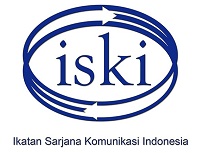The role of family communication: Family health and welfare during pandemic covid
Abstract
The Covid-19 pandemic causes psychological stress, such as fear and anxiety, and requires exceptional recovery. Such conditions can lead to mental disorders and the risk of developing physical health even in a healthy person without a medical history. The purpose of this study was to find a theoretical model of the relationship between family communication, physical resilience, and family economic well-being, to describe the role of the family in maintaining family health during the pandemic, and describe the role of the family in maintaining family economic well-being during the COVID-19 pandemic. This study uses a quantitative method with a descriptive and correlational approach. The population in Rancatungku Village, Bandung Regency, West Java Province, is an area affected by COVID-19, with a total sample of 420 respondents. The results obtained that Family Communication affects Family Physical Resilience, with an effect of 40% due to positive communication and direct interaction with family members as a protective factor for facilities and the needs of family members. The existence of an atmosphere of mutual protection means that the family must be a safe, comfortable, and reassuring place for all its members. Family communication does not affect Family Economic Resilience, with a contribution of only 10%; this is related to the strategy and quick decision-making by the family to think about recovery from the situation. Family Communication affects the Pandemic Impact on Families by 80%. Communication is critical as a protective function of changes that arise from the pandemic and is seen as a family management system. In addition, the pandemic was declared to impact work activities and social activities but had no impact on activities at home or emotional and physical activities.
Keywords
Full Text:
PDFReferences
Ahlert, I. A., & Greeff, A. P. (2012). Resilience factors associated with adaptation in families with deaf and hard of hearing children. American Annals of the Deaf, 157(4), 391–404. https://doi.org/10.1353/aad.2012.1629
Brahma, B. (2020). Oncologists and COVID-19 in Indonesia: What can we learn and must do? Indonesian Journal of Cancer, 14(1), 1. https://doi.org/10.33371/ijoc.v14i1.728
Braithwaite, D. O., Suter, E. A., & Floyd, K. (2018). Engaging theories in family communication: multiple perspectives (2nd ed.). Routledge. (Second Edi; D. O. Braithwaite, E. A. Suter, & K. Floyd., Eds.). Retrieved from https://www.taylorfrancis.com/books/edit/10.4324/9781315204321/engaging-theories-family-communication-dawn-braithwaite-elizabeth-suter-kory-floyd?refId=e95df092-a934-49fe-b41c-e00155fa6765&context=ubx
Bull, G. M. (1980). The weather and deaths from pneumonia. The Lancet, 315(8183), 1405–1408. https://doi.org/10.1016/S0140-6736(80)92666-5
Buzzanell, P. M. (2010). Resilience: talking, resisting, and imagining new normalcies into Being. Journal of Communication, 60(1), 1–14. https://doi.org/10.1111/j.1460-2466.2010.01469.x
Chew, J., & Haase, A. M. (2016). Psychometric properties of the family resilience assessment scale: A Singaporean perspective. Epilepsy and Behavior, 61, 112–119. https://doi.org/10.1016/j.yebeh.2016.05.015
Cucinotta, D., & Vanelli, M. (2020). WHO declares COVID-19 a pandemic. Acta Biomedica, 91(1), 157–160. https://doi.org/10.23750/abm.v91i1.9397
Dalziel, B. D., Kissler, S., Gog, J. R., Viboud, C., Bjørnstad, O. N., Metcalf, C. J. E., & Grenfell, B. T. (2018). Urbanization and humidity shape the intensity of influenza epidemics in US cities. Science, 362(6410), 75–79. https://doi.org/10.1126/science.aat6030
Decree of the Minister of Health of the Republic of Indonesia. Prevention and control of corona virus disease 2019 (Covid-19). , Pub. L. No. MenKes/413/2020, 2019 207 (2020).
Deist, M., & Greeff, A. P. (2015). Resilience in families caring for a family member diagnosed with dementia. Educational Gerontology, 41(2), 93–105. https://doi.org/10.1080/03601277.2014.942146
Editor Team. (2020). SMRC survey: Impact of covid-19, 59 percent of respondents think household economy will deteriorate. Retrieved May 12, 2020, from Kompas.com, 12 Mei website: https://nasional.kompas.com/read/2020/05/12/15280211/survei-smrc-dampak-covid-19-59-persen-responden-anggap-ekonomi-rumah-tangga?page=all
Ellis, B. L., Gergen, J., Wohlgemuth, L., Nolan, M. T., & Aslakson, R. (2016). Empowering the “cheerers”: role of surgical intensive Care unit nurses in enhancing Family Resilience. American Association of Critical-Care Nurses, 25(1), 39–45.
Epstein, N. B., Bishop, D., Ryan, C., Miller, I., & Keitner, G. I. (1993). The McMaster model: View of healthy family functioning. In Guilford Family Therapy Series. Normal family processes, 2nd ed. (pp. 138–160). New York, NY, US: The Guilford Press.
Epstein, P. R. (2001). West nile virus and the climate. Journal of Urban Health : Bulletin of the New York Academy of Medicine, 78(2), 367–371.
Fitzpatrick, M. A. (1993). Communication in family relationship. New Jersey: Prentice Hall.
Fowler, D. (2020). Virus corona: Efek psikologis setelah kehilangan pekerjaan selama pandemi Covid-19. Retrieved April 28, 2022, from Bbc website: https://www.bbc.com/indonesia/vert-cap-52408458
Galih, B. (2020). UPDATE May 16: There are 17,025 Covid-19 cases in Indonesia, 529 more. Retrieved from Kompas.com website: https://nasional.kompas.com/read/2020/05/16/15463951/update-16-mei-ada-17025-kasus-covid-19-di-indonesia-bertambah-529
Indonesian Disability Convention Team. (2017). Laporan bayangan Indonesia : Implementasi konvensi pbb hak-hak penyandang disabilitas. Retrieved from https://www.sigab.or.id/sites/default/files/field/attachment/Laporan Bayangan CRPD Indonesia - versi Bahasa Indonesia.pdf
kemenpppa. (2016). Press release: menteri PP dan PA : hapuskan diskriminasi pada penyandang disabilitas. Retrieved from https://www.kemenpppa.go.id/index.php/page/read/29/111/press-release-menteri-pp-dan-pa-hapuskan-diskriminasi-pada-penyandang-disabilitas
Lampung Geh. (2019). 9,9 Juta anak disabilitas menjadi korban kejahatan seksual. Retrieved from https://kumparan.com/lampunggeh/9-9-juta-anak-disabilitas-menjadi-korban-kejahatan-seksual-1551366208275112332
Macphee, D., Lunkenheimer, E., & Riggs, N. (2015). Resilience as regulation of developmental and family processes. Family Relations, 64(1), 153–175. https://doi.org/10.1111/fare.12100
Markson, L., Lösel, F., Souza, K., & Lanskey, C. (2015). Male prisoners’ family relationships and resilience in resettlement. Criminology and Criminal Justice, 1–19. https://doi.org/10.1177/1748895814566287
McDermott, B. M., Cobham, V. E., Berry, H., & Stallman, H. M. (2010). Vulnerability factors for disaster-induced child post-traumatic stress disorder: The case for low family resilience and previous mental illness. Australian and New Zealand Journal of Psychiatry, 44(4), 384–389. https://doi.org/10.3109/00048670903489916
Musfiroh, M., Mulyani, S., Cahyanto, E. B., Nugraheni, A., & Sumiyarsi, I. (2019). Analisis faktor-faktor ketahanan keluarga Di kampung Kb Rw 18 Kelurahan Kadipiro Kota Surakarta. PLACENTUM: Jurnal Ilmiah Kesehatan Dan Aplikasinya, 7(2), 61–66. https://doi.org/10.20961/placentum.v7i2.32224
Nam, B., Kim, J. Y., DeVylder, J. E., & Song, A. (2016). Family functioning, resilience, and depression among North Korean refugees. Psychiatry Research, 245, 451–457. https://doi.org/10.1016/j.psychres.2016.08.063
Nuraini, T. N. (n.d.). Inilah dampak panjang dari virus corona bagi kesehatan tubuh. Retrieved December 10, 2021, from https://www.merdeka.com/trending/inilah-dampak-panjang-dari-virus-corona-bagi-kesehatan-tubuh-kln.html
Organization, W. H. (n.d.). Coronavirus disease (COVID-19) pandemic. Retrieved from https://www.who.int/emergencies/diseases/novel-coronavirus-2019
Pappas, G., Kiriaze, I. J., Giannakis, P., & Falagas, M. E. (2009). Psychosocial consequences of infectious diseases. Clinical Microbiology and Infection, 15(8), 743–747. https://doi.org/10.1111/j.1469-0691.2009.02947.x
Petersilia, J., Foote, J., Crowell, N. A., & National Research Council. (2001). Crime victims with developmental disabilities report of a workshop. Washington DC: NATIONAL ACADEMY PRESS.
Ramadhana, M. R. (2020). Mempersiapkan ketahanan keluarga selama adaptasi kebiasaan baru di masa pandemi covid-19. Jurnal Kependudukan Indonesia, 61–68. https://doi.org/10.14203/jki.v0i0.572
Shin, S. H., Choi, H., Kim, M. J., & Kim, Y. H. (2010). Comparing adolescents’ adjustment and family resilience in divorced families depending on the types of primary caregiver. Journal of Clinical Nursing, 19(11–12), 1695–1706. https://doi.org/10.1111/j.1365-2702.2009.03081.x
Stephen W. Littlejohn, Foss, K. A., & Oetzel, J. G. (2016). Theories of human communication eleventh edition. In Waveland Press, Inc. (Eleventh e, Vol. 53). https://doi.org/10.1017/CBO9781107415324.004
Van Riper, M. (2007). Families of children with down syndrome: Responding to “a change in plans” with resilience. Journal of Pediatric Nursing, 22(2), 116–128. https://doi.org/10.1016/j.pedn.2006.07.004
Walsh, F. (2016). Family resilience: a developmental systems framework. European Journal of Developmental Psychology, 13(3), 1–12. https://doi.org/10.1080/17405629.2016.1154035
Ye, Z. J., Qiu, H. Z., Li, P. F., Liang, M. Z., Wang, S. N., & Quan, X. M. (2017). Resilience model for parents of children with cancer in mainland China-An exploratory study. European Journal of Oncology Nursing, 27, 9–16. https://doi.org/10.1016/j.ejon.2017.01.002
Yuan, J., Yun, H., Lan, W., Wang, W., Sullivan, S. G., Jia, S., & Bittles, A. H. (2006). A climatologic investigation of the SARS-CoV outbreak in Beijing, China. American Journal of Infection Control, 34(4), 234–236. https://doi.org/10.1016/j.ajic.2005.12.006
DOI: https://doi.org/10.24198/jkk.v10i1.39251
Refbacks
- There are currently no refbacks.
Copyright (c) 2022 Maulana Rezi Ramadhana, Dewi Kurniasih Soedarsono, Retno Setyorini

This work is licensed under a Creative Commons Attribution-NonCommercial-ShareAlike 4.0 International License.
Jurnal Kajian Komunikasi Indexed by:
Editorial Office of Jurnal Kajian Komunikasi:
Faculty of Communication Science, Universitas Padjadjaran
Jl. Raya Bandung-Sumedang Km. 21 Jatinangor, Sumedang 45363, Indonesia
WA: +6282316731181 (Chat Only)
Telephone: +62227796954
Faxmile: +62227794122
E-mail: jurnal.kajian.komunikasi@unpad.ac.id
Jurnal Kajian Komunikasi Supervised by:











